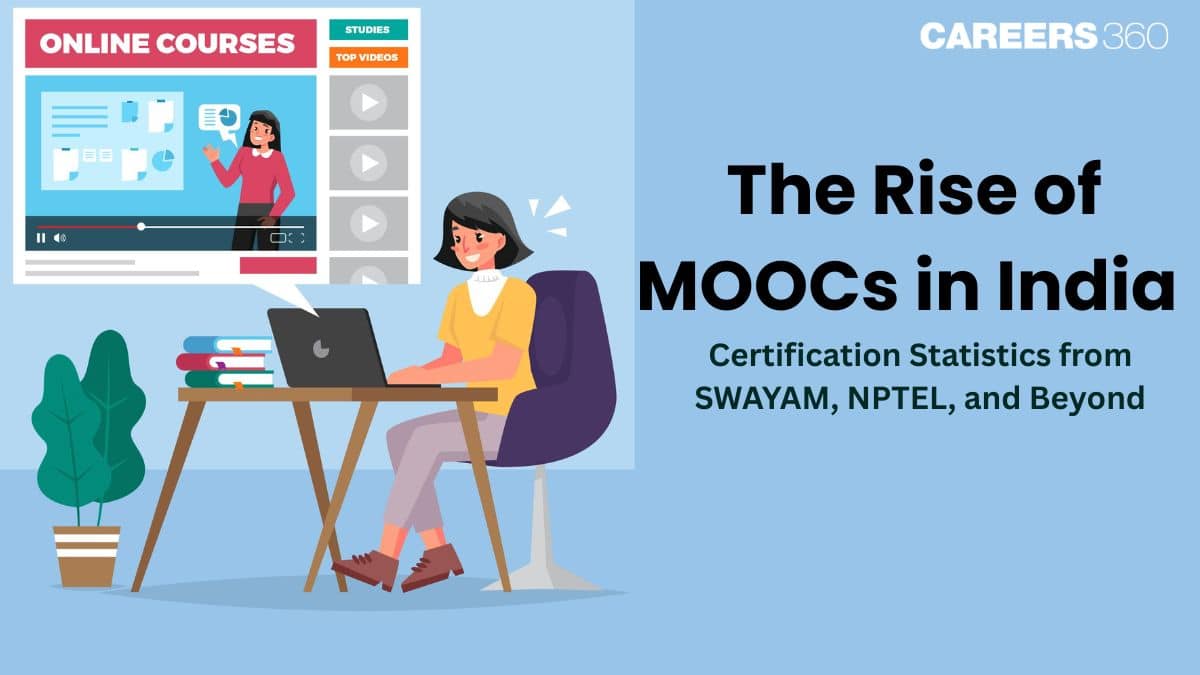The Rise of MOOCs in India: Certification Statistics from SWAYAM, NPTEL, and Beyond
The rise of online degrees and MOOCs has become one of the major reasons for the shift in the way of learning methodology. From traditional learning methods to the approach of online certifications, MOOCs help students to access good education without having a financial burden and without considering location. Platforms such as SWAYAM and NPTEL are popular among students, as they can upskill their academic knowledge, earn certifications and enhance their employability. Therefore, with the initiatives from the government in the form of MOOCs, students can also register to private MOOC platforms such as Coursera, edX, Udemy, and so many others to take advantage of the wide range of free online courses available with certificates. Continue reading below for the full article.
This Story also Contains
- The Evolution of MOOCs in India
- SWAYAM: A Student-Friendly Learning Hub
- NPTEL: Strengthening Technical Education
- Top MOOCs: Beyond SWAYAM and NPTEL

The Evolution of MOOCs in India
Online education in India began in 2017 with the establishment of SWAYAM, created by the Government of India to develop the three key aspects of the education policy: access, equity, and quality. SWAYAM allows for many subjects to be taught to students from school to post-graduate level, through free online certification courses.
At the same time, the National Programme on Technology Enhanced Learning (NPTEL) started by the Indian Institutes of Technology (IITs) and the Indian Institute of Science (IISc), successfully provides quality courses in engineering and technology. Linkage to SWAYAM strengthens both NPTEL and SWAYAM by providing the capacity for additional names.
SWAYAM: A Student-Friendly Learning Hub
SWAYAM courses are offered in different domains such as engineering, humanities, management, law, and basic sciences. SWAYAM portal is designed with students as well as working professionals in mind, offering flexible learning schedules, video lectures, interactive quizzes, and assignments.
SWAYAM: Key Statistics
Metric | Data |
Courses Offered | More than 1,690 ongoing UGC-recognised courses (July 2025) |
Total Enrollments | More than 5.5 crore |
Certificates Issued | Around 45 lakhs |
Exam Mode | Hybrid (Computer-Based & Proctored Exams) |
Certification Fee | Rs. 500 to Rs. 1,000 per course |
How to Get SWAYAM Certification?
- Visit the SWAYAM portal - swayam.gov.in
- Check the list of ongoing SWAYAM courses
- Enroll in the desired course.
- Complete all assignments and quizzes.
- Register for the NTA SWAYAM exam
- Appear for the proctored exam (optional but required for certification).
Student Tip: Choosing SWAYAM courses aligned with the career goals or higher education aspirations can give the students an edge in internships, campus placements, and competitive exams.
NPTEL: Strengthening Technical Education
With the support of IITs and IISc, NPTEL courses are focussed on delivering knowledge-intensive and industry aligned syllabus that complement formal college education.
NPTEL: Key Statistics
Metric | Data |
Courses Available | 3,200+ unique courses |
Total NPTEL Course Enrollments | More than 3.44 crore |
NPTEL Exam Registrations | More than 63.3 lakhs |
Local Chapters | 7,200+ colleges |
Certificates Issued | 8,387 MOOCs completed |
Industry Associates | 100+ |
Student Highlights: In the Jan-April 2025 semester, Madan Mohan Malaviya University of Technology students achieved top national ranks:
- Top 1%: 43 students
- Top 2%: 44 students
- Top 5%: 112 students
National Toppers: 2 students scored 98/100 in “Basic Principles and Calculations in Chemical Engineering,” earning Elite + Gold certificates.
Comparative Analysis: SWAYAM vs. NPTEL
Feature | SWAYAM | NPTEL |
Initiative By | Government of India | IITs and IISc, Under the Ministry of Education |
Course Offerings | 1,690+ courses | 3,200+ courses |
Target Audience | School to PG students | UG and PG technical students |
Certification Mode | Hybrid (CBT & Proctored Exams) | Proctored Exams |
Certification Fee | Rs. 500 to Rs. 1,000 per course | Rs. 1,000 per course |
Certificates Issued | More than 45 lakhs | 8,387 MOOCs completed |
Top MOOCs: Beyond SWAYAM and NPTEL
Other MOOC platforms are providing an impact on student learning as well, by providing a range of opportunities in response to diverse needs. Coursera and edX partner with top global universities to offer various academic courses across several fields, while Udemy focuses on skill-based and professional development learning as an opportunity for individuals to gain knowledge in practical skills. Meanwhile, UpGrad and Simplilearn focus on job-oriented academic learning and provide professional certifications accredited by industry professionals so that learners can perform better in the job market.
MOOCs have a vital role in skill improvement because they provide students with practical and industry-oriented knowledge to augment the academic curriculum of social work education. Traditional classrooms focus more on theoretical, whereas MOOCs have been started with the motive of providing a practical understanding of the latest tools and technologies to the learners. With the culture of lifelong learning, students can develop new skills and keep pace with their industry-relevant knowledge with the help of MOOCs.
